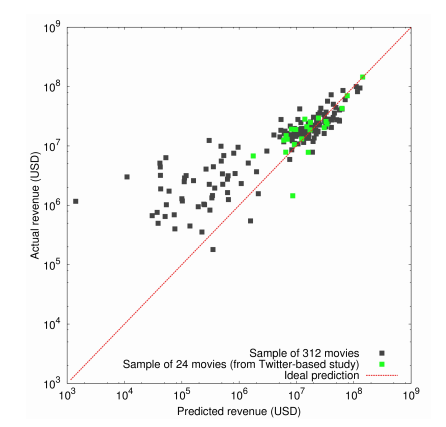Now Wikipedia Used to Predict Movie Box Office Revenues
Social media services such as Twitter provide a fascinating insight into the collective mind and mood. Computational social scientists say they can see evidence in the Twitter stream of all kinds of events in real time. Among these phenomena are traffic jams, rainbows and even earthquakes. It’s not hard to imagine a service that updates people about these things as they happen.

Much harder is the ability to make forecasts. However various groups say they can use the Twitter stream to predict the outcome of elections, stock market prices and future box office revenues.
Today, Marton Mestyan from the Budapest University of Technology and Economics in Hungary, and a couple of pals, say that the patterns of behaviour on Wikipedia can lead to similar predictions. In particular, they use this behaviour to predict box office revenue of movies a month before they are released.
These guys examined the Wikipedia entries for 312 movies released in 2010. They looked in particular at the number of viewers, the number of human editors, the number of edits and another factor related to editing called the collaborative rigor.
They then measure the correlation between this data and the success of the movie as measured by box office revenue over the release weekend.
Their results show that the combined activity measures on Wikipedia are highly correlated with box office revenue when movies are particularly successful.
“We show that the popularity of a movie could be predicted well in advance by measuring and analyzing the activity level of editors and viewers of the corresponding entry to the movie in Wikipedia,” say Mestyan and co.
There is a caveat, however. Wikipedia is not so good at predicting box office revenues for less successful movies.
There’s an interesting factor related to this. One feature of the box office data is that it is bimodal–it has two peaks. So lots of movies are successful and lots of movies are moderately successful. In between there is a trough.
None of the Wikipedia activity measures have this kind of twin-peaked behaviour. So it’s not really a surprise that it correlates with only some of the box office data.
It may be that earlier Twitter-based studies show the same limitation. Mestyan and co say that the Twitter only works for the most successful movies as well, and only after the opening night.
By contrast, Wikipeida data seems to correlate with some box office data up to a month before release.
That’s interesting because it extends the sphere of social media predictions beyond Twitter and into Wikipedia.
But this works lacks a resounding slam dunk. Various researchers have thrown cold water on the idea that social media can make useful predictions about the future.
Indeed, it’s all very well using historical data to make ‘predictions’ about the past. What would be far more impressive is to use current data to make predictions about the future.
And until Mestyan and co can do that in a repeatable, unambiguous way, it’ll be hard to think of this work, and others like it, as much more than a curious correlation.
Ref: arxiv.org/abs/1211.0970:Early Prediction of Movie Box Office Success based on Wikipedia Activity Big Data
Keep Reading
Most Popular
Large language models can do jaw-dropping things. But nobody knows exactly why.
And that's a problem. Figuring it out is one of the biggest scientific puzzles of our time and a crucial step towards controlling more powerful future models.
How scientists traced a mysterious covid case back to six toilets
When wastewater surveillance turns into a hunt for a single infected individual, the ethics get tricky.
The problem with plug-in hybrids? Their drivers.
Plug-in hybrids are often sold as a transition to EVs, but new data from Europe shows we’re still underestimating the emissions they produce.
Stay connected
Get the latest updates from
MIT Technology Review
Discover special offers, top stories, upcoming events, and more.